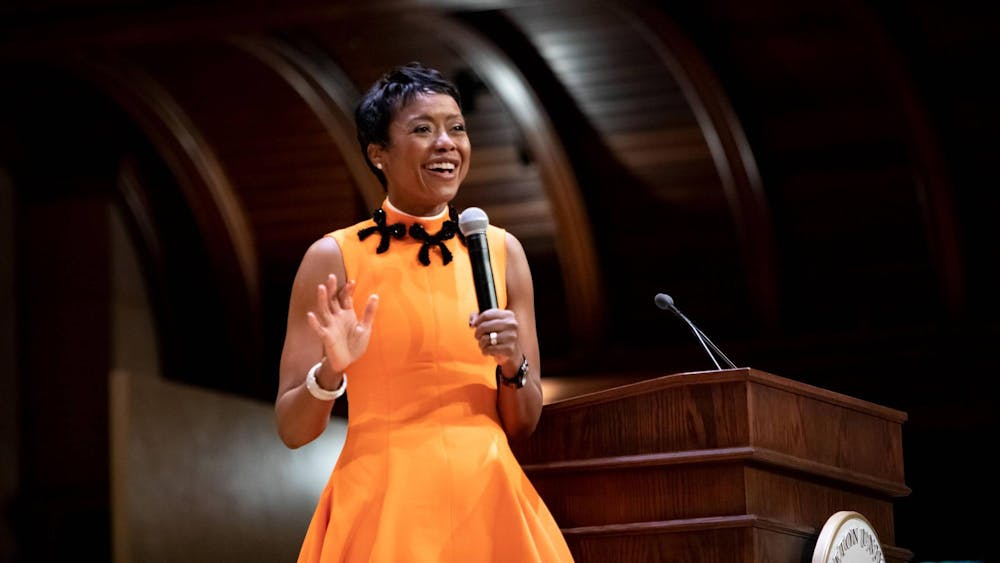The following is a guest contribution and reflects the author’s views alone. For information on how to submit a piece to the Opinion section, click here.
The data is stark: 70 percent of Class of 2025 alumni who expect to earn above $120,000 next year say that they will not be working in the service of humanity, while 77 percent of those making under $90,000 say they will. However, the idea of working “in the service of humanity” reflected in these numbers is too narrow — earning to support one’s family and earning to give are both noble, service-oriented goals in themselves.
In response to one of my past editorials, Jia Cheng Shen ’28 recently argued that a Princeton education is not merely a private benefit but a public good — one that is enabled by institutional wealth, federal funding, and societal generosity. This, he claims, creates a moral responsibility for students to serve the public. He further contends that the relative freedom Princeton students enjoy from debt and financial strain should deepen their ethical obligation to use their education in the service of others — though for some middle-income students, a Princeton education can come with significant debt.
I agree that deciding on a career path in college means weighing different values, such as ambition, service, and the pursuit of self-understanding. While Shen acknowledges the need for students from low-income households to earn to give back to their families, by writing that “overlooking our responsibility to the public is no small error,” he shows the stigma still faced by students who are just trying to help their families and inadvertently reveals an elitist bias.
Low-income and first-generation students are not rejecting learning, public service, or self-discovery when they opt for well-paying careers. In fact, outstanding alumni like Mellody Hobson ’91 demonstrate that pursuing these careers can amplify our ability to give back to both their families and the public at large, ensuring the longevity of the institutional values Shen espouses.
As Shen notes, “Ten years after graduation, the average Princeton alum is making more than double the national average for college graduates.” Yet for many, that extra income is not being spent frivolously. I know a friend in the economics department, a low-income student who, after graduating, took a job in investment banking at Goldman Sachs and used their salary to pay for a younger sibling’s state college tuition and to prevent their family’s home from going into foreclosure.
A high-paying career can be key to serving by giving back to one’s own family. Shen’s view unfairly criticizes working-class students for avoiding risks they cannot afford to take. It is not practical to encourage students into service careers without accounting for the material realities they face. While Shen suggests that graduating debt-free can give “relative insulation from financial stress,” for students who need to support their families, that isn’t enough. No one should be playing guessing games about someone’s financial situation without knowing the full picture.
Furthermore, if service is truly about advancing the well-being of others, lifting one’s family out of poverty or holding together a fragile household must also count. A 2024 Pew Research report found that 43 percent of young adults from lower-income families financially support their parents, compared with 28 percent of those from middle-income families and 19 percent from higher-income families. Yet Shen’s piece places insufficient weight on the real-world constraints faced by many students, resulting in an incomplete view of their moral responsibility.

Moreover, the reality is that pursuing financial success can open the door to greater service to the public good in terms of impact. Once individuals have built stability and influence, they are often able to give back on a scale that transforms entire communities. Few alumni embody this more powerfully than Mellody Hobson, whom I admire deeply. Raised in Chicago by a single mother who sometimes had to heat bathwater on a hot plate when the gas was cut off, she acquired a fierce determination to understand money and how to manage it. Recruited to Princeton by John Rogers Jr. ’80, she interned at his firm, Ariel Investments, returned after graduation, and rapidly rose through the ranks, becoming president at 31 and co-CEO in 2019.
Hobson’s extraordinary accomplishments have allowed her to give back in enduring ways. She helped found Ariel Community Academy on Chicago’s South Side to teach financial literacy to primarily Black students; created Project Black, a $1.45 billion fund aimed at growing Black- and Latino-owned businesses; and provided the lead gift that made Princeton’s Hobson College — the first residential college to be named after a Black person — possible. She demonstrates that financial success and public service are not mutually exclusive, but profoundly connected.
Philanthropy has long played a vital role in sustaining the institutions that shape public life, including the University. And as federal funding for higher education and research declines, its importance is greater than ever. Universities, the arts, and public media, once sustained by strong government support, are increasingly dependent on private donors to fill growing funding gaps. Recent cuts to research grants at leading universities have already triggered layoffs, halted projects, and eliminated billions of dollars in funding, threatening America’s capacity to innovate and educate. As public budgets shrink, donors’ generosity is not merely admirable, but essential to the survival of the nation’s civic and cultural infrastructure.
Hobson’s story underscores a simple truth: Before you can give back, you must first get by. Taking a high-paying career can help us give back to both our own families and society at large. Financial security is not at odds with intellectual seriousness or social responsibility; in fact, it can enable a more profound and lasting impact.

Joel Ibabao Jr. is an Economics major from Queens, N.Y., and the founder and president of the Princeton Undergraduate Society of Ethics. He can be reached at joelibabao[at]princeton.edu.
Please send any corrections to corrections[at]dailyprincetonian.com.








